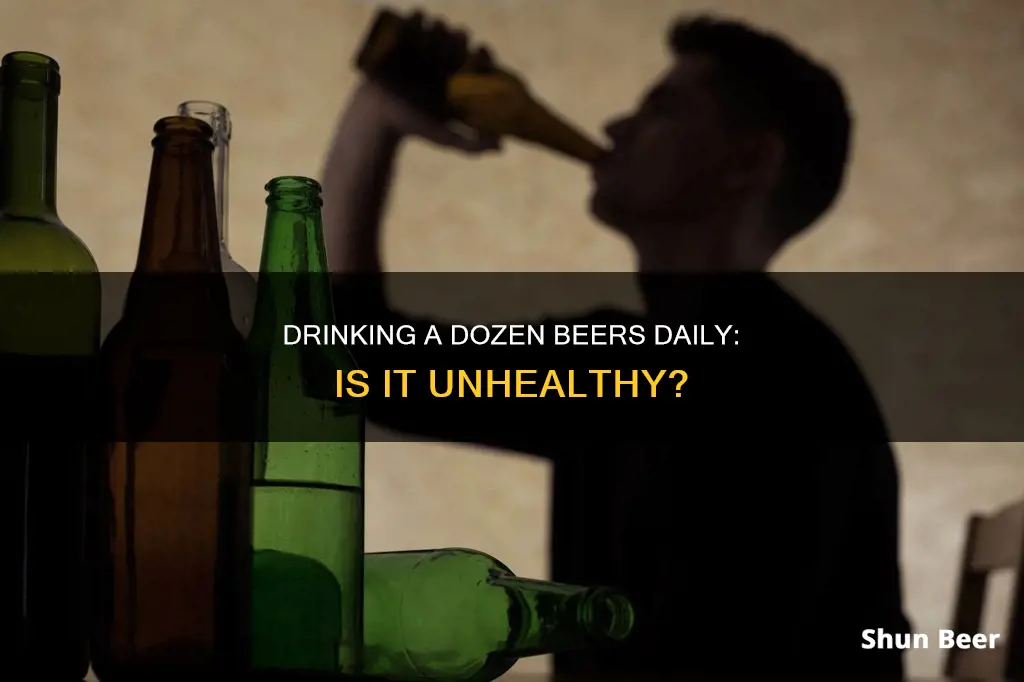
Drinking 12 beers a day can have serious negative impacts on your health and longevity. It is considered heavy drinking and can lead to a variety of health issues, including liver damage, heart problems, and an increased risk of certain cancers. The excessive intake of alcohol can also result in short-term consequences such as intoxication, dehydration, nausea, and vomiting. Seeking help and support is crucial for those looking to address their drinking habits and improve their overall well-being.
| Characteristics | Values |
|---|---|
| Health Issues | Liver damage, heart problems, high blood pressure, stroke, cancer, pancreatitis, cardiovascular disease, malnourishment, vitamin deficiency, weakened immune system, obesity, depression, anxiety, etc. |
| Mental Health Issues | Impaired cognitive function, memory issues, concentration issues, decision-making issues, depression, anxiety, etc. |
| Social Consequences | Strained relationships, decline in social well-being, increased domestic violence, etc. |
| Financial Consequences | High cost of purchasing 12 beers a day, impulsive spending habits, neglecting financial responsibilities, etc. |
| Legal and Safety Concerns | Increased risk of accidents, impaired judgment, drunk driving, engaging in illegal activities, etc. |
What You'll Learn

Liver damage
Drinking 12 beers a day can have serious detrimental effects on your liver. The liver is responsible for filtering toxins from the body, including alcohol. However, when the liver is continuously exposed to high levels of alcohol, it can become overloaded and unable to function properly.
Excessive alcohol consumption can lead to a condition known as alcoholic liver disease, which can cause inflammation, scarring, and even liver failure. This condition can be fatal if not treated in time.
One of the first liver diseases caused by alcohol consumption is fatty liver disease. This is characterised by increased fat inside liver cells and can gradually develop in 90% of those who drink more than 1/2 ounce (15 ml) of alcohol per day.
In heavy drinkers, binge drinking can cause the liver to become inflamed. If left untreated, this inflammation can lead to liver cirrhosis, a serious and irreversible condition where liver cells die and are replaced with scar tissue. Liver cirrhosis is associated with many serious health problems and may eventually require a liver transplant.
In addition to the direct effects of alcohol on the liver, heavy drinking can also contribute to nutritional deficiencies, such as vitamin B12 and magnesium deficiencies. This is because beer contains empty calories and lacks essential nutrients, which can lead to inadequate intake of important vitamins and minerals necessary for maintaining overall health.
Overall, drinking 12 beers a day poses a significant risk to liver health and can lead to serious and potentially life-threatening liver damage. It is important to prioritise health, seek support if needed, and make positive changes to drinking habits to improve overall health and well-being.
RV Drinking Laws: Beer and Driving
You may want to see also

Cardiovascular issues
Drinking 12 beers a day can have a profoundly negative impact on cardiovascular health. This level of consumption is considered "heavy drinking" and can lead to severe health issues, including an increased risk of cardiovascular disease.
Heavy drinking can cause high blood pressure, which is a significant risk factor for cardiovascular issues. High blood pressure increases the workload on the heart and blood vessels, leading to a higher risk of heart attack and stroke, and other cardiovascular events. It can also lead to irregular heart rhythms, which can be life-threatening.
In addition to high blood pressure, heavy drinking can also contribute to the development of cardiovascular disease through other mechanisms. Alcohol consumption can lead to an increase in triglyceride levels, which are types of fat in the blood. High triglyceride levels are associated with an increased risk of cardiovascular disease.
Drinking 12 beers a day can also cause weight gain, which is another risk factor for cardiovascular disease. The excess calories from alcohol can contribute to weight gain and obesity, which can put additional strain on the heart and blood vessels.
Furthermore, heavy drinking can lead to an increased risk of blood clots, which can cause heart attacks and strokes. Alcohol can also interfere with the body's ability to break down blood clots, further increasing the risk of cardiovascular events.
The impact of heavy drinking on the heart is not limited to structural or functional changes. It can also affect the electrical system of the heart, leading to arrhythmias or irregular heartbeats. These arrhythmias can be dangerous and even life-threatening in some cases.
In conclusion, drinking 12 beers a day can have severe negative consequences on cardiovascular health. It can lead to high blood pressure, weight gain, increased risk of blood clots, and arrhythmias, all of which are significant risk factors for cardiovascular disease and other cardiovascular events. It is crucial to understand these risks and make informed decisions about alcohol consumption to maintain a healthy cardiovascular system.
Beer and Drug Testing: What's the Verdict?
You may want to see also

Mental health
Drinking 12 beers a day can have detrimental effects on mental and emotional well-being. Here are some of the key impacts:
Impaired Cognitive Function
Excessive alcohol consumption, including beer, can impair cognitive function. This can lead to difficulties with memory, concentration, and decision-making. Alcohol affects the brain by interfering with neurotransmitters, resulting in slower reaction times, decreased coordination, and impaired judgement.
Heavy beer consumption is associated with an increased risk of mental health problems such as depression and anxiety. Alcohol is a depressant that can exacerbate existing mental health conditions or contribute to the development of new ones. Prolonged heavy drinking increases the risk of developing conditions such as depression and anxiety disorders. It can also lead to an increased risk of suicidal thoughts.
Social and Relationship Consequences
Excessive drinking can strain relationships and negatively impact social interactions. It may lead to conflicts, isolation, and a decline in overall quality of life. Alcohol can change behaviour, leading to aggression and irritability, which can put a strain on personal relationships. Prioritising drinking over social activities and responsibilities can lead to isolation and a decline in social well-being.
Alcohol Use Disorder (AUD)
Drinking 12 beers a day can also increase the risk of developing Alcohol Use Disorder (AUD). AUD is a chronic disease characterised by compulsive alcohol use despite negative consequences. Individuals with AUD may experience severe physical and mental health consequences and may require professional treatment.
Beer and Blood Donation: Can They Mix?
You may want to see also

Weight gain and obesity
Drinking 12 beers a day can have a significant impact on weight gain and obesity. While moderate alcohol consumption may not lead to weight gain, heavy drinking is more consistently associated with weight gain and obesity. Here are some key points to consider:
Caloric Intake and Appetite:
- Beer is an alcoholic drink that contains calories, with about two-thirds of the calories coming from alcohol and one-third from carbohydrates. A standard 12-ounce (355-milliliter) serving of beer with 4% alcohol content contains approximately 153 calories.
- Alcoholic beverages contribute additional calories to the diet. The energy from alcohol is additive to that from other food sources, leading to a passive overconsumption of energy.
- Alcohol consumed before or with meals tends to increase food intake by enhancing the rewarding effects of food.
- Studies suggest that drinking alcohol can increase appetite in the short term, leading to increased calorie intake.
Fat Burning and Metabolism:
- Drinking alcohol can interfere with fat burning. The body prioritizes the breakdown of alcohol over other sources of fuel, including stored fat.
- Alcohol intake decreases fat oxidation as the body suppresses the oxidation of other macronutrients while processing alcohol.
- Alcohol consumption may also influence hormones related to satiety and energy intake, such as leptin and glucagon-like peptide-1 (GLP-1).
Health Risks and Other Factors:
- Excessive alcohol consumption is associated with an increased risk of chronic diseases, including heart disease, high blood pressure, and certain types of cancer.
- Obesity is a multifactorial condition influenced by various factors such as diet, physical activity, sleep, genetics, and lifestyle choices.
- Heavy drinking can lead to nutritional deficiencies as beer provides calories but lacks essential vitamins, minerals, and nutrients.
- The relationship between alcohol consumption and weight gain is complex and involves drinking patterns, gender, beverage type, and lifestyle factors.
- Men are more likely to develop a "beer belly" due to heavier drinking habits, android fat distribution (storing fat around the belly), and the effect of alcohol on testosterone levels.
Beer Festivals: A Guide to the Frothy Fun
You may want to see also

Social consequences
Drinking 12 beers a day can have a range of social consequences that can negatively impact an individual's life. Here are some of the key social consequences associated with consuming 12 beers a day:
- Strained relationships and social isolation: Excessive alcohol consumption can lead to behavioural changes such as aggression and irritability, straining personal relationships. Prioritising drinking over social activities can also result in isolation and a decline in social well-being.
- Impaired judgement and risky behaviours: Heavy drinking impairs judgement and decision-making skills, which can result in risky or dangerous behaviours. This includes driving under the influence, engaging in unprotected sex, or making poor financial decisions.
- Negative impact on professional life: Regular heavy drinking can lead to absenteeism and poor performance at work, potentially resulting in job loss or other negative consequences.
- Financial consequences: The cost of purchasing 12 beers a day can quickly add up, straining finances. Excessive drinking may also lead to impulsive spending, neglect of financial responsibilities, and prioritising alcohol over essential needs.
- Domestic violence: Heavy drinking is associated with increased rates of domestic violence, which can have devastating effects on family members and loved ones.
- Social and economic issues: Alcohol dependence resulting from heavy drinking can lead to job loss, relationship breakdown, and financial troubles.
It is important to recognise that these social consequences can have a significant impact on an individual's life and well-being. Seeking help from professionals trained in addiction treatment is crucial to improving overall health and well-being and repairing damaged relationships.
Organic Beer and Gout: Is It Safe to Drink?
You may want to see also
Frequently asked questions
Heavy drinking is generally defined as consuming more than 3-4 drinks per day for women and more than 4 drinks per day for men. Drinking 12 beers a day far exceeds this threshold and is considered excessive.
Drinking 12 beers a day can lead to a range of physical health issues, including liver damage, heart problems, high blood pressure, weight gain, and an increased risk of certain cancers. It can also cause dehydration, nausea, and vomiting.
Excessive alcohol consumption can have negative impacts on mental health, including an increased risk of depression and anxiety. It can also impair cognitive functioning, affecting memory, attention span, and decision-making abilities.
Yes, heavy drinking can strain relationships and have negative social consequences. It may lead to increased conflict, impaired communication, social isolation, and a decline in overall quality of life.
Recognizing that there may be a problem with excessive alcohol consumption is the first step. Seeking professional help and support is crucial, and there are various resources available, including support groups, counseling, and rehabilitation programs.







